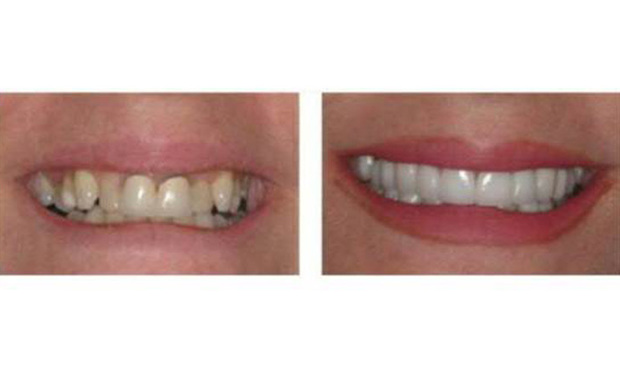Pay Attorney Fees or Face Trial: Court Brushes Off Dentist's Request to Dismiss Suit
Chief U.S. District Judge Mark E. Walker found that the plaintiff in a copyright lawsuit over before-and-after dentistry photos had withheld important evidence in the case.
November 05, 2019 at 05:07 PM
5 minute read
 Dentist Mitchel Pohl's patient teeth before and after. Courtesy photos.
Dentist Mitchel Pohl's patient teeth before and after. Courtesy photos.
A plaintiff dentist who elected to toss his own copyright infringement lawsuit weeks before trial, after the defense produced damaging evidence, faces a choice from Chief U.S. District Judge Mark E. Walker in the Northern District of Florida.
The judge agreed to dismiss the case without prejudice on one condition: the plaintiff would have to pay the defendant's attorney fees and costs for two and a half years of litigation.
"The plaintiff, therefore, has two options," the ruling said. "He can either decline to dismiss, decline to pay and take his chances at trial; or he can accept the dismissal with the condition set forth in this order."
The ruling didn't offer much to smile about for Boca Raton cosmetic dentist Mitchel Pohl, who sued an internet media company in April 2018 after discovering that before-and-after shots of one of his patients, referred to as "Belinda," appeared on multiple websites without his permission.
Walker's ruling is the latest twist in a case that was dismissed in June 2018 and revived in May.
While Walker had ruled the photos of Belinda's teeth weren't creative or original enough to merit copyright protection, the U.S. Court of Appeals for the Eleventh Circuit found that that was a question for jurors to answer.
A trial was scheduled for October, but in the weeks before, defense attorneys Matthew Nelles and Adriana Kostencki of Nelles Kostencki in Fort Lauderdale acquired some crucial information from the U.S. Copyright Office: a string of emails that were game-changing for his client, MH SUB I LLC, known as Internet Brands.
The plaintiff's attorney, William Hollimon of Hollimon P.A. in Tallahassee, did not respond to requests for comment by deadline.
According to Monday's ruling, the dentist had previously claimed that he'd mistakenly entered the wrong year on a copyright registration form for his website in 2005. He alleged that he wrote 2000 instead because he'd innocently misinterpreted of the application form, an explanation Walker had accepted.
But Walker found Pohl's team had failed to disclose email evidence that showed an examiner from the Copyright Office had asked him whether he wanted to change the date to 2005, but he chose to keep it at 2000.
"In sum, plaintiff failed to provide relevant evidence to defendant, despite defendant's request, which was in their possession and which could have resolved this case on summary judgment," Walker wrote.
The revelation bolsters Nelles long-held argument that because the teeth photos were taken in 2004, they didn't fall under Pohl's 2000 copyright protection.
"Obviously, in the year 2000, these 2004 photographs didn't exist," Nelles said. "So whatever website he had in the year 2000 for sure did not contain these photographs."
When the plaintiff then moved to dismiss without prejudice, Walker made "a reasonable inference that plaintiff seeks dismissal to avoid an expected adverse ruling."
"Strikingly, plaintiff offers no reasons for seeking voluntary dismissal of this lawsuit, claiming only that he seeks dismissal 'for a variety of reasons that are not relevant to this motion,'" the order said.
'We live for these types of issues'
 Matthew Nelles of Nelles Kostencki. Courtesy photo.
Matthew Nelles of Nelles Kostencki. Courtesy photo.Nelles said he discovered the emails in October after independently asking the Copyright Office for documents.
"We never envisioned that we would come across such an important document as those emails," Nelles said.
The ruling could be significant for the copyright arena, according to Nelles, as the case touches on somewhat novel and unexplored areas of law, including whether or not the information on a registration certificate holds more authority than the actual work submitted to the copyright office.
"The case for us has been a highly intriguing case because of such core, important copyright issues," he said. "This is sort of what we litigate IP and copyright cases for. We live for these types of issues to arise and to have to deal with them."
Also unusual is that the Copyright Office didn't simply accept the deposited material, but actually asked Pohl questions about it to clarify his intentions.
"He wrote an email back saying, 'This is exactly what I want, I want the 2000.' It was deliberate," Nelles said.
It's been an unusually expensive case for the defense, mottled with discovery, motions, appellate work and trial preparation.
"The attorney fees substantially outweigh any potential damages," Nelles said.
The plaintiff has until Nov. 12 to make a decision.
Read the court order:
Read more: How to Lose a Copyright Case: Court Finds Photos of Teeth Lack Sufficient Bite
Florida Court to Tackle Copyright Question Over Embedded Tweets
This content has been archived. It is available through our partners, LexisNexis® and Bloomberg Law.
To view this content, please continue to their sites.
Not a Lexis Subscriber?
Subscribe Now
Not a Bloomberg Law Subscriber?
Subscribe Now
NOT FOR REPRINT
© 2025 ALM Global, LLC, All Rights Reserved. Request academic re-use from www.copyright.com. All other uses, submit a request to [email protected]. For more information visit Asset & Logo Licensing.
You Might Like
View All
Local Boutique Expands Significantly, Hiring Litigator Who Won $63M Verdict Against City of Miami Commissioner
3 minute read
Greenberg Traurig Combines Digital Infrastructure and Real Estate Groups, Anticipating Uptick in Demand
4 minute read
US Judge Cannon Blocks DOJ From Releasing Final Report in Trump Documents Probe
3 minute read
Plaintiffs Allege Carollo Retaliated Over Bayfront Trust Accounting Discoveries
3 minute readTrending Stories
- 1Pogo Stick Maker Wants Financing Company to Pay $20M After Bailing Out Client
- 2Goldman Sachs Secures Dismissal of Celebrity Manager's Lawsuit Over Failed Deal
- 3Trump Moves to Withdraw Applications to Halt Now-Completed Sentencing
- 4Trump's RTO Mandate May Have Some Gov't Lawyers Polishing Their Resumes
- 5A Judge Is Raising Questions About Docket Rotation
Who Got The Work
J. Brugh Lower of Gibbons has entered an appearance for industrial equipment supplier Devco Corporation in a pending trademark infringement lawsuit. The suit, accusing the defendant of selling knock-off Graco products, was filed Dec. 18 in New Jersey District Court by Rivkin Radler on behalf of Graco Inc. and Graco Minnesota. The case, assigned to U.S. District Judge Zahid N. Quraishi, is 3:24-cv-11294, Graco Inc. et al v. Devco Corporation.
Who Got The Work
Rebecca Maller-Stein and Kent A. Yalowitz of Arnold & Porter Kaye Scholer have entered their appearances for Hanaco Venture Capital and its executives, Lior Prosor and David Frankel, in a pending securities lawsuit. The action, filed on Dec. 24 in New York Southern District Court by Zell, Aron & Co. on behalf of Goldeneye Advisors, accuses the defendants of negligently and fraudulently managing the plaintiff's $1 million investment. The case, assigned to U.S. District Judge Vernon S. Broderick, is 1:24-cv-09918, Goldeneye Advisors, LLC v. Hanaco Venture Capital, Ltd. et al.
Who Got The Work
Attorneys from A&O Shearman has stepped in as defense counsel for Toronto-Dominion Bank and other defendants in a pending securities class action. The suit, filed Dec. 11 in New York Southern District Court by Bleichmar Fonti & Auld, accuses the defendants of concealing the bank's 'pervasive' deficiencies in regards to its compliance with the Bank Secrecy Act and the quality of its anti-money laundering controls. The case, assigned to U.S. District Judge Arun Subramanian, is 1:24-cv-09445, Gonzalez v. The Toronto-Dominion Bank et al.
Who Got The Work
Crown Castle International, a Pennsylvania company providing shared communications infrastructure, has turned to Luke D. Wolf of Gordon Rees Scully Mansukhani to fend off a pending breach-of-contract lawsuit. The court action, filed Nov. 25 in Michigan Eastern District Court by Hooper Hathaway PC on behalf of The Town Residences LLC, accuses Crown Castle of failing to transfer approximately $30,000 in utility payments from T-Mobile in breach of a roof-top lease and assignment agreement. The case, assigned to U.S. District Judge Susan K. Declercq, is 2:24-cv-13131, The Town Residences LLC v. T-Mobile US, Inc. et al.
Who Got The Work
Wilfred P. Coronato and Daniel M. Schwartz of McCarter & English have stepped in as defense counsel to Electrolux Home Products Inc. in a pending product liability lawsuit. The court action, filed Nov. 26 in New York Eastern District Court by Poulos Lopiccolo PC and Nagel Rice LLP on behalf of David Stern, alleges that the defendant's refrigerators’ drawers and shelving repeatedly break and fall apart within months after purchase. The case, assigned to U.S. District Judge Joan M. Azrack, is 2:24-cv-08204, Stern v. Electrolux Home Products, Inc.
Featured Firms
Law Offices of Gary Martin Hays & Associates, P.C.
(470) 294-1674
Law Offices of Mark E. Salomone
(857) 444-6468
Smith & Hassler
(713) 739-1250






